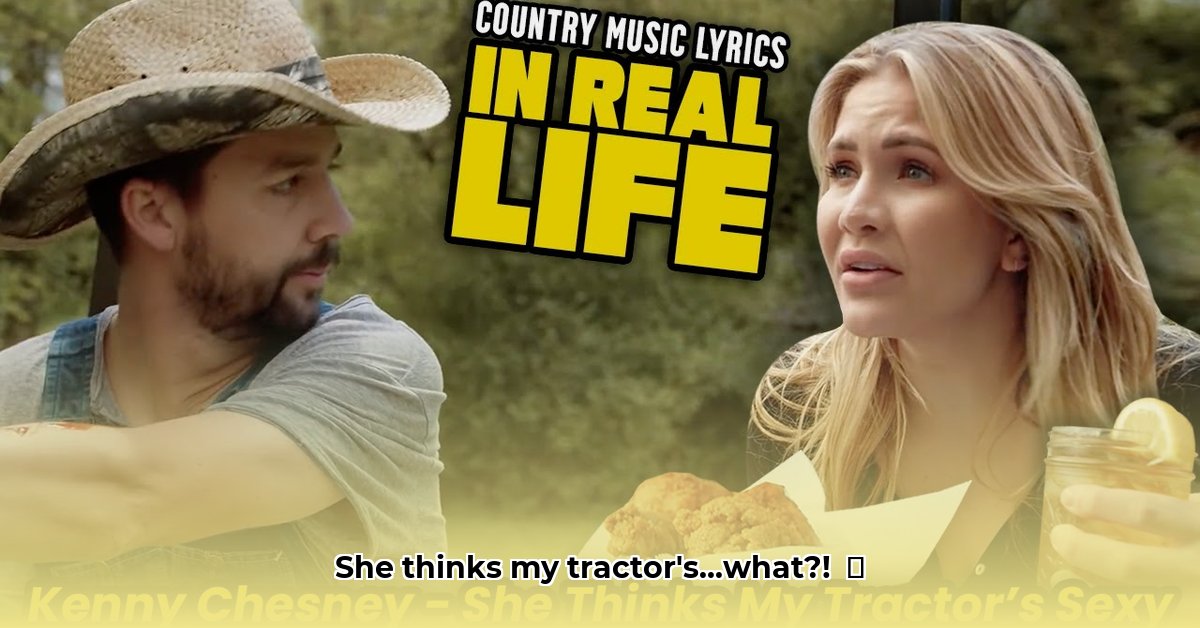
She Thinks My Tractor's Sexy: A Deep Dive into Lyrics and Cultural Impact
Kenny Chesney's "She Thinks My Tractor's Sexy," a seemingly simple country tune, has achieved enduring popularity, prompting a deeper examination of its lyrical content and broader cultural significance. While the song's immediate appeal lies in its catchy melody and relatable imagery of rural romance, a closer analysis reveals a more complex interplay of themes and symbols that continue to resonate with listeners. This exploration delves into the song's lyrical nuances, its place within the country music genre, and its lasting impact on the perception of rural life and gender roles. For another perspective on tractors in country music, check out this analysis of Billy Strings' tractor song.
The song's initial charm stems from its straightforward portrayal of a simple, idyllic existence. The lyrics evoke a sense of Southern hospitality and tradition with imagery like "a basket of chicken and a big cold jug of sweet tea," instantly creating a warm, inviting atmosphere. The central image – the tractor – transcends its literal function as farm equipment, becoming a potent symbol of rugged masculinity, hard work, and connection to the land. This subtle shift elevates the song beyond a simple love song, suggesting that the man's appeal extends beyond his physical appearance, emphasizing his work ethic and inherent qualities. But does this romanticized view truly represent the realities of rural life? This question lies at the heart of the song's lasting cultural impact. Is it a fair representation or a harmful stereotype?
Chesney's blending of country and pop elements played a crucial role in the song's widespread appeal. By bridging the gap between traditional country and mainstream pop, he achieved a level of crossover success rarely seen in the genre. This strategic genre fusion, some experts argue, has served as a template for other country artists seeking wider audiences. This impactful blending of music styles is a significant topic that deserves further exploration, potentially revealing valuable insights into successful cross-genre strategies. The success of this fusion raises a key question: How much of the song's success is attributed to the music itself and how much to this successful genre blending?
The song's broader cultural impact extends to its portrayal of rural life. Does "She Thinks My Tractor's Sexy" accurately represent the realities of farming communities? Or does it present a highly romanticized, idealized version, overlooking the hardships and complexities inherent in agricultural life? The song's seemingly simplistic depiction of rural life, some argue, overlooks the daily struggles and complexities faced by farming communities.
Furthermore, the song's depiction of gender roles warrants careful consideration. The female perspective, while seemingly unconventional by expressing attraction to a man based on his masculinity and occupation, invites a nuanced interpretation. Does the song subtly challenge traditional gender norms or does it reinforce existing stereotypes? It is important to acknowledge that such interpretations can be multifaceted and open to different perspectives, leading to further discussions. This aspect, and the complexities it inherently possesses, is further complicated by the broad cultural spectrum in which "She Thinks My Tractor's Sexy" has resonated.
Ultimately, the meaning of "She Thinks My Tractor's Sexy" remains open to interpretation. Its enduring appeal often stems from listeners' ability to connect the lyrical content to their personal experiences. This ambiguity, rather than hindering its impact, contributes to its lasting power and cultural significance. However, the song has also faced criticism for its contribution to the "bro-country" subgenre, a criticism which often focuses on its simplistic themes and stereotypical portrayals of rural life and gender dynamics.
Three Pivotal Points:
- The tractor functions as a powerful symbol of rural masculinity, hard work, and connection to the land, adding depth beyond a simple romantic narrative.
- Chesney's genre-bending approach significantly broadened the song's appeal, influencing future country music strategies.
- The song sparked ongoing debate about the portrayal of rural life and gender roles in popular culture, highlighting the complexities of romanticized versus realistic depictions.
How Has "She Thinks My Tractor's Sexy" Shaped Perceptions of Rural Life?
Did "She Thinks My Tractor's Sexy" accurately reflect the reality of rural life, or did it reinforce stereotypes? This question has fueled debate since the song's release.
The song’s simplicity, while contributing to its appeal, also drew criticism for potentially perpetuating simplistic and stereotypical portrayals of rural life. The song's lighthearted nature and focus on a seemingly superficial aspect of rural life are seen by some as a romanticized, even unrealistic, portrayal of rural communities. Conversely, others defend the song's harmless nature, viewing it as escapistic entertainment rather than a documentary of rural life.
The song's association with the "bro-country" subgenre further complicates its reception. Bro-country music, known for often simplistic themes and party anthems, has faced criticism for its potential to reinforce stereotypes and oversimplify complex social realities. As "She Thinks My Tractor's Sexy" aligns with bro-country aesthetics, its contribution to shaping perceptions of rural life becomes even more nuanced and complex.
Despite its commercial success, the song's legacy remains a subject of ongoing discussion, with some perceiving it as a harmlessly catchy tune and others criticizing it for its potentially harmful stereotypes about rural culture. The debate shows that a song's commercial success doesn't always correlate with its contribution to a more accurate societal portrayal. This conflict highlights the complexities of interpreting the cultural impact of popular music.